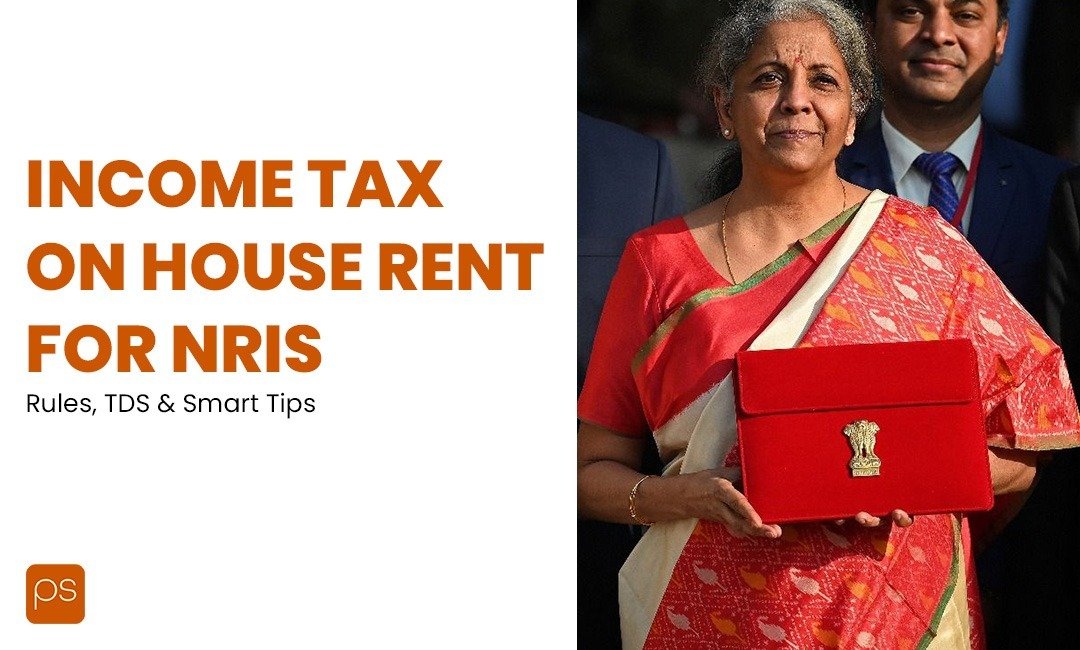For many Non-Resident Indians (NRIs), owning property in India is not just a matter of emotional connection—it is also a smart investment. With urbanization and rising property values, rental income from these properties has become a reliable source of earnings. However, along with this comes the responsibility of paying income tax on house rent in India.
In this blog, we’ll walk you through everything you need to know about tax on rental income for NRIs, from rules and TDS to exemptions and smart tips to save tax.
Understanding Income Tax on House Rent for NRI
Rental income earned from property in India is taxable in India, regardless of where the NRI resides. This is because rental income is considered income generated in India, and hence, it falls under Indian tax laws.
The rent received is taxable under the head “Income from House Property” in the Indian Income Tax Act. After adjusting for standard deductions, municipal taxes, and home loan interest (if applicable), the balance amount is considered taxable income.
TDS on Rental Income for NRIs
One of the most crucial rules to understand is TDS (Tax Deducted at Source).
- If the tenant is paying rent to an NRI landlord, the tenant is obligated to deduct TDS at 30% (plus applicable surcharge and cess) before transferring the rent.
- This is higher than resident landlords, where TDS is only 5% (if rent exceeds ₹50,000 per month).
- The tenant must also file Form 15CA and 15CB with the Income Tax Department while remitting the payment to the NRI’s bank account.
This makes it essential for NRIs to ensure their tenants are aware of these compliance rules, otherwise penalties may apply.
How to Calculate Tax on Rental Income?
The taxable rental income for NRIs is calculated as follows:
Gross Rent Received
(-) Municipal Taxes Paid
= Net Annual Value (NAV)
(-) Standard Deduction of 30% of NAV
(-) Home Loan Interest (if any, under Section 24(b))
= Taxable Rental Income
The taxable rental income is then added to other income (if any) and taxed as per applicable Income Tax Slabs for NRIs.
Exemptions & Deductions Available
Even though NRIs pay higher TDS, there are several ways to save tax on rental income:
- Standard Deduction – A flat 30% deduction on the Net Annual Value (NAV) for repairs and maintenance, regardless of actual expenses.
- Municipal Taxes – Property tax paid to the local authority is deductible from gross rent.
- Home Loan Interest – If the NRI has taken a loan to buy the property, interest repayment is deductible under Section 24(b).
- Joint Ownership – If the property is co-owned, the rental income can be split proportionately, reducing the tax burden.
- Double Taxation Avoidance Agreement (DTAA) – Many countries have DTAA with India, allowing NRIs to claim credit for taxes paid in India when filing taxes abroad.
Filing Income Tax Return (ITR) as an NRI
NRIs must file ITR in India if their taxable income (including rental income) exceeds ₹2.5 lakh in a financial year.
- ITR-2 Form is generally used by NRIs having rental income.
- Filing is done online via the Income Tax e-filing portal.
- Even if the tenant has deducted full TDS, filing ITR helps claim refunds if excess TDS was deducted.
Smart Tips for NRIs to Manage Tax on Rental Income
Here are some practical tips to reduce tax liability and stay compliant:
- Choose Joint Ownership: Buying property jointly with a spouse or family member splits the rental income and reduces the overall tax burden.
- Leverage Home Loan Benefits: Interest paid on a housing loan can substantially reduce taxable rental income.
- Use DTAA Benefits: Check if your country of residence has a DTAA treaty with India to avoid paying tax twice on the same income.
- Hire a Property Manager: NRIs often face compliance issues. A professional property manager or CA in India can handle rent collection, TDS, and tax filing.
- Stay Updated with Online Property Portals: Platforms like Online Property Portal not only help in finding tenants but also provide tools for rental agreements, tax calculations, and compliance reminders.

Common Mistakes NRIs Should Avoid
- Ignoring TDS Rules: Tenants must deduct 30% TDS; otherwise, penalties may arise.
- Not Filing ITR: Even if TDS is deducted, failing to file ITR may cause issues with refunds and compliance.
- Overlooking Municipal Taxes: Many NRIs forget to claim deductions for property tax paid, which increases taxable income unnecessarily.
- Not Using DTAA: Paying double tax when a treaty benefit is available is a costly mistake.
Role of Online Property Portals
Modern Online Property Portals play a crucial role for NRIs. These platforms simplify:
- Tenant screening and rent collection
- Automated TDS compliance alerts
- Property management updates
- Access to tax-related tools like rent calculators and deduction checklists
By leveraging these portals, NRIs can manage their property remotely while ensuring compliance with Indian tax laws.
Final Thoughts
Owning property in India as an NRI can be a lucrative investment, but understanding income tax on house rent is crucial to maximize earnings. While tenants must deduct TDS at 30% on rent payments to NRIs, the tax liability can be reduced significantly through standard deductions, home loan benefits, and municipal tax claims.
With smart planning, compliance, and the use of modern tools like Online Property Portals, NRIs can not only simplify tax filing but also ensure that their rental income works efficiently for them.In short: Stay informed, leverage deductions, and use professional help when needed—because smart tax planning is just as important as smart investing.



